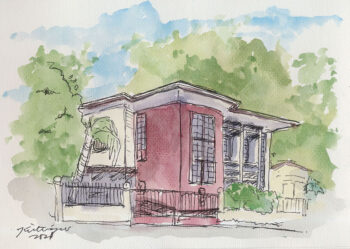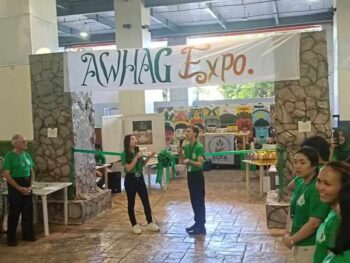DAVAO CITY (MindaNews / 22 May) — Based on online posts, one would think that all everyone cared about on May 19, 2018 was the Royal Wedding. But on that same day, against the tide, the forum “Revisiting Marawi from the Lens of Interfaith Dialogue and Multiculturalism” was held by Konsyensya Dabaw in cooperation with VSO and Ateneo de Davao University. And what a pleasant surprise to see the venue filled with an audience sincerely concerned with creating “spaces for Dabawenyos to participate in efforts to understand what happened to Marawi from the perspectives of survivors, and increase awareness on the current conditions of the people who remain displaced.”
The featured speakers, Fr. Chito Soganub, who had been taken in captivity during the siege for almost four months, and Prof. Dalomabi Bula of Mindanao State University, a displaced resident of Ground Zero, and the personal accounts they brought to the forum were indubitable. To hear Fr. Chito say that his ordeal strained his “spiritual sanity,” despite his twenty years of serving the prelature of Marawi was heartbreaking, especially in the light of our own bouts questioning God’s presence in these times when evil seems to reign. When he shared, “You sleep in your tears and wake in them,” I felt that the audience somehow glimpsed the light in his soul, not the dark.
Prof. Bula, resident of Barangay Marinaut in Ground Zero bemoaned the lack of support for home-based internally displaced persons (IDP), which comprise 80-94% of the total number. But aside from their basic needs for food and shelter, she noted that what the Meranaws have truly lost because of the siege is their identity. As a retired professor of literature, she sees beyond the physical, and believes that their forced diaspora is but a continuation of the historical injustice that the Moros have suffered in our country. Prof. Bula reiterated the importance of being able to come home to Marawi in order to practice their culture and religion, which are intimately joined. But it seems that the residents of the Most Affected Areas (MAA) can only visit occasionally until 2021. Her question, “Can we be called Meranaws without the lake (Ranao)?” strikes a deep chord even among those of us who are not Meranaw but empathize with the need to be connected to home.
Yet despite their past and present hardship, both also focused on efforts to rebuild rather than what has been lost. Fr. Chito’s advocacy, aside from continuing interfaith dialogues through the NGO Pakigdait, is seeking ways to provide psychosocial support for children and youth suffering from Post Traumatic Stress Disorder. Aside from the basic concern of getting them back to regular school, what can be done to help them deal with the trauma of the war and the displacement?
Prof. Bula emphasized the need for a comprehensive recovery and rehabilitation plan that is culturally sensitive. As it is, the Meranaws have barely even been consulted regarding the national government’s Task Force Bangon Marawi. How can Marawi rise again if the rehabilitation plan had been created without consultation with the very people who have suffered the war? Thus, they continue to suffer the powerlessness and the losses.
Prof. Bula asked the audience, “How far will you walk with us?” And I wondered, for myself, if I were even prepared to stand beside them. I have never even been to Marawi. I felt like a useless eavesdropper in the conversation, unable to contribute anything at all to recovery efforts.
The forum also served to commemorate the first year that Martial Law in Mindanao was declared by President Rodrigo Duterte. Thus, the opportunity to discuss the rehabilitation of Marawi using interfaith dialogue led by survivors of the siege was necessarily done within the context of political realities. Konsyensya Dabaw asserts its concern over how Martial Law allows “continuing military control over Marawi” (and other areas of Mindanao) and how this is “neither promoting local civilian efforts to retake control of Marawi’s rehabilitation, nor addressing the many cases of rights violations and injustices against Meranaws and other victim-survivors.”
As a culminating activity, the audience was asked to write their wishes for Marawi and peace in Mindanao. It was an interactive task that highlighted the importance of participating in the process and not just listening from the outside. For some of us, articulating our prayers may be enough for now, but we also hope that one day this faith may translate into specific action.
(MindaViews is the opinion section of MindaNews. Jhoanna Lynn B. Cruz is an award-winning writer who teaches literature and creative writing at the University of the Philippines-Mindanao in Davao City and is a columnist of Mindanao Times.This piece was first published in the Mindanao Times issue of May 21, 2018 – http://mindanaotimes.net/lugar-lang-one-year-later-creating-space-for-marawi/. With permission to republish. Follow or message her on Twitter @jhoannalynncruz)







